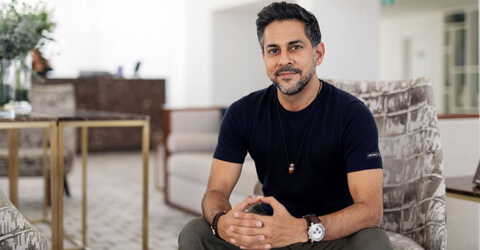- 15 Global Companies Launch Trusted Tech Alliance for Secure Digital Infrastructure
- Singapore Management University Launches Business AI Master’s Programme
- Cochin Shipyard Seeks Global Partners to Expand International Ship Repair Footprint
- OpenText Names Former IBM Americas President Ayman Antoun as CEO
- Fintech Company Network International Appoints Ashish Jain as Group CFO
Tag: Global Leader
Adrian Gore founded Discovery in South Africa in 1992 – with a core purpose ‘to make people healthier and enhance and protect their lives.’ Discovery is now a global financial services organization renowned for the Vitality Shared-Value Insurance model, which incentivizes] behaviour change and integrates this into insurance and financial services pricing. This pioneering model is transforming insurance markets globally, integrated into the offerings of leading insurers such as AIA, Generali, John Hancock, Manulife, Sumitomo and Ping An Health, with over 27 million impacted lives in over 35 markets. Adrian is a member of Business Leadership South Africa; Vice President of Business Unity South Africa; sits on the Columbia University Mailman School of Public Health Board of Overseers; and the World Economic Forum Global Health and Healthcare Industries group.
Adrian Gore grew up in a traditional middle-class Jewish family in Johannesburg, South Africa, and attended a Jewish day school. His family were entrepreneurial but had a laser focus on providing Adrian with quality education above all. He says, “My parents fundamentally valued education above money and business; we weren’t a family that worked in a large corporate environment. In fact, my mother still harbours a mistrust of big companies to this day.” He continues, “I had a very intellectual, values-centric upbringing. I think that coalescing of entrepreneurship together with a focus on education and values was a very healthy environment.”
To further his pursuit of quality education, Adrian received an Actuarial Science Degree at the University of Witwatersrand. He then joined Liberty Life, a life insurance company that emboldened his foundation in the industry.
Talking about what made him choose this career, he says, “This field naturally attracted mathematically-minded people, but it was also a pretty rare profession, which meant you had good job prospects both locally and globally. With the country just coming out of apartheid and concerns about the future, this potential for offshore employment was attractive to young people. It also provided a rigorous way of thinking about finance, money, and institutional scale. I don’t think I quite knew what I was getting into at the time when I went into actuarial science, but it was an absolute gift.”
His experience at Liberty Life, started by a famed South African entrepreneur, Donald Gordon, gave Adrian the perfect blend of actuarial science and entrepreneurship. That experience lit a fire in him – he says, “Knowing that an institutional business that is very actuarial, and very conservative, can have a massive impact on society was a eureka moment for me. If you’re entrepreneurial in that context, the power is remarkable.”
Adrian set out to create a lasting impact of his own. He adds, “When I am building something of scale that positively impacts society, I feel the most incredible sense of achievement. Creating change inspires me.”
To further this mission, Adrian founded Discovery with a unique Vitality model, which changes insurance from a static grudge purchase to an engaging offering that makes people healthier. He adds, “That’s been our core purpose from day one – making people healthier, and it was an idea born out of the unique South African context at the time we started Discovery.”
When Adrian founded the business in 1992, South Africa was transitioning out of apartheid, and the regulatory system outlawed any discrimination because of its history. But the nation also had terrible levels of disease burden and too few doctors.
Adrian notes that the new egalitarian system was needed and appropriate given the country’s history. It did, however, create some unique challenges from an insurance point of view. He explains, “You can’t price health insurance accurately – by age, gender, and pre-existing condition. And you have a massive demand issue and too few doctors. How do you create a sustainable health insurance business? So our idea was, could we make people healthier? Could we prevent them from getting ill in the first place? So we created a model that prioritized prevention by encouraging and incentivizing people to do good things for their health.”
The Vitality model focuses on behavioural components that decrease disease and risk, such as physical activity and healthy eating; incentivizes healthier behaviours through regular engagement and personalized goals, and links this to the price of insurance. In the process, value is created and shared between the insurer (better profits, lower claims), the client (improved health and increased value) and society (healthier, more productive population).
This model has been academically validated to drive better health outcomes, with highly engaged members demonstrating 10% lower hospital admissions, 10-30% lower hospital costs, and 25% shorter hospital stays. Reinsurers have also validated the long-term mortality impact of Vitality, where on average, members have 42% improved mortality rates, and highly engaged members show a 76% reduction in mortality. Vitality members in South Africa live 16 years longer than the average insured population.
A powerful example of Vitality’s impact on physical activity levels is its partnership with Apple, initiated in 2016, whereby members can earn their Apple Watch through exercise. Vitality sustainably increased members’ levels of physical activity by using loss-framed incentives – giving the Apple Watch to clients upfront and reducing monthly payments to zero if they were physically active. A study of more than 500,000 people across South Africa, the UK and the US found that those engaged in the Vitality Active Rewards with Apple Watch program were 34% more active on a sustained basis – equating to an additional five days of activity every month. The results, validated by RAND Europe through an extensive longitudinal study, showed that behaviour change was evident across different demographics and countries and amplified within the most unhealthy and high-risk populations. Furthermore, the Vitality HealthyFood program, which rewards healthy food purchases, is associated with a 9% increase in nutritional food basket composition comprised of a 29% increase in fruit and vegetable consumption and over 30% decrease in sugar consumption and salt.
Due to his pioneering work in the industry, Adrian has won numerous awards for leadership and entrepreneurship, including the Sunday Times Business Leader of the Year (2010); the McKinsey Geneva Forum of Health Award (2015); CNBCA-ABN Forbes, Business Leader of the Year (2016); Frost and Sullivan Visionary Innovation Leadership Award for Africa (2017); Ernst & Young Global Lifetime Achiever Award (2018); and the Actuarial Society of South Africa President’s Award (2020).
In conclusion, his advice for budding leaders is, “It’s critical for your business to have a purpose – I believe that great organizations are those focused on helping to solve society’s problems. It’s not about having many ideas but about honing in on a problem and then dedicating yourself to it. That is when true innovation takes place.”
While LinkedIn was predominantly used as a job-seeker and employer portal, in recent years, it has emerged as one of the winning social media platforms to grow your personal brand. However, many...
Lex Sokolin is a futurist and entrepreneur working on the next generation of financial services. He is the Head Economist and Global Fintech Co-Head at ConsenSys, a blockchain technology company building...
Cristina Junqueira is the Co-Founder and Vice President of Branding and Business Development at Nubank. Prior to this, she worked at Itaú Unibanco for several years, dealing with Products and Marketing...
Vishen Lakhiani is a Malaysian entrepreneur, author, and motivational speaker of Indian descent. He is the founder and CEO of Mindvalley and the author of two books: The Code of the Extraordinary Mind and...











